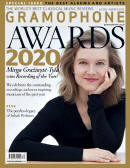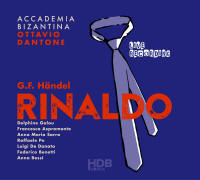Texte paru dans: / Appeared in: |
|
|
Outil de traduction (Trčs approximatif) |
|
|
Reviewer:
David Vickers Accademia Bizantina launches its own label with a live recording of a production staged in Como by OperaLombardia. The theatre acoustic is excellent, the sound engineering has immaculate clarity of detail, the band’s playing juxtaposes vigour and precision, and a predominantly Italian cast act their roles extrovertly. Ottavio Dantone claims to have merged the 1711 original score with Handel’s radical alterations for a revival in 1731. This is not the case: none of the numerous 1731 substitutions or interpolations are incorporated; in reality, this is a drastically cut-down 1711 version. You know there has been widespread cropping when Acts 2 and 3 of one of Handel’s longest operas can fit on the same disc. Some who feel that Torquato Tasso’s easily distracted crusaders take an unseemly long time to get on with conquering Jerusalem might not mind this so much. Delphine Galou cultivates a tone of bitter extremity and breathy antagonism in a spiky approach to ‘Cara sposa’ (the contrapuntal strings are choppy); this is not for those who prefer smoothly melodic melancholy in Rinaldo’s lament. Galou’s sure-footed fioritura, pitted alongside zesty violin and bassoon, has thrilling panache in ‘Venti, turbini prestate’. There is lucid disdain at Armida’s unwanted advances (‘Abbruggio, avampo e fremo’), and the call-to-arms ‘Or la tromba’ is suitably valorous (Dantone fields three trumpets instead of the four Handel’s score demands). Anna Maria Sarra makes a spectacular impact with stratospheric ornaments in Armida’s tempestuous entrance ‘Furie terribili’, but such convoluted embellishments become obstructive during the sorceress’s bickering duet with Rinaldo (‘Fermati! No crudel!’). On the plus side, there is pathos in her heartbroken soliloquy after Rinaldo’s scornful departure (‘Ah! crudel nel pianto mio’), and furious brilliance when she gives vent to hypocritical jealousy in ‘Vo’ far guerra’ (featuring florid harpsichord solos). Francesca Aspromonte gives sparkling accounts of Almirena’s ‘Combatti da forte’ (its obbligato oboe part played superbly) and ‘Augelletti, che cantate, zefiretti’ (featuring three recorders, including high sopranino emulations of birdsong, although Handel asked for only two); ‘Lascia ch’io pianga’ is heart-rending until overembellishment gilds the lily. Argante’s rumbustious arrival to parley with the crusaders (‘Sibillar gli angui d’Aletto’) is sung with convivial wittiness by Luigi De Donato rather than mere bellicosity (trumpets, dovetailing oboes and rushing strings all rhythmically taut); his infatuation with the imprisoned Almirena has Polyphemus-like frustration (‘Basta che sol tu chieda’). Raffaele Pe sings Goffredo with emotive boldness; ‘Mio cor’ captures a firm sense of alarm at Rinaldo going AWOL. Dantone’s fleet-footed tempos are effective, although a few numbers could afford to be more relaxed in personality and subtler in texture (the lovers’ flirtatious duet ‘Scherzano sul tuo volto’ takes a while to settle), and there are a few miscalculations such as busily arpeggiating harpsichord and soloing archlute throughout the sirens’ ‘Il vostro maggio’ (a vilota in which less would be more). Several uncut studio recordings offer pristine interpretations, so there is a welcome place for Dantone’s living and breathing theatrical representation. |
|




